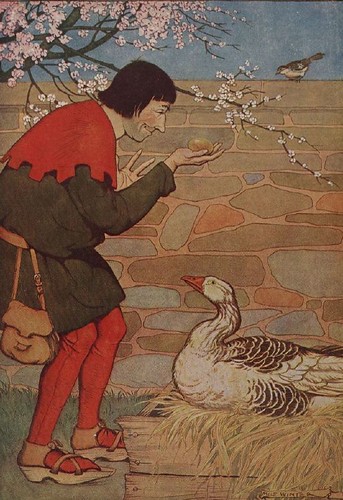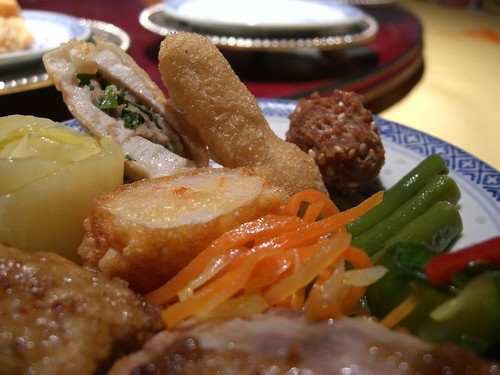
22nd Sunday in Ordinary Time (B)
The Goose is for the Golden Egg
Readings: Deuteronomy 4:1-2, 6-8; Psalm 15:2-3, 3-4, 4-5; James 1:17-18, 21b-22, 27; Mark 7:1-8, 14-15, 21-23
Picture: cc kjarrett
Sisters and brothers, I think most of us have heard the story about the farmer who had the tremendous good fortune of owning a goose that laid a golden egg each day? Eager to get rich quick, and thinking that all the eggs are stored in the belly of the bird, the farmer kills it and, of course, loses everything. No more goose. No more eggs. The moral of the story: greed will get you nowhere, especially when it’s coupled with stupidity.
But here’s another story about two other farmers each of whom has also been given a goose that lays golden eggs. The first farmer is unlucky. His goose is a nuisance and a troublemaker. Not only does it refuse to be toilet trained, it is also highly aggressive. It often intimidates the other animals and sometimes even attacks the farmer and his family. Finally, unable to tolerate all the nonsense any longer, the disillusioned farmer kills his goose, thus terminating his precious supply of golden eggs.
The second farmer is very different. As bizarre as it may sound, this one actually falls in love with his goose and pampers it to no end. Not only does he feed it with rich gourmet food – food that is really quite unsuitable for geese – he also refuses to let it do any work. He even goes to the extent of dressing up the poor animal in all sorts of designer clothes and jewelry. As you might expect, because of this kind of treatment, the goose soon becomes overweight and sickly. Eventually, its health issues became so serious that it can no longer lay eggs, golden or otherwise. But the farmer is so distracted by the tasks of feeding and dressing up the goose that he doesn’t even notice.
Sisters and brothers, I know you’ve not heard this story before (since I made it up). But what do you think might be its moral? What possible connection might it have to our Mass readings today? What is its relevance for us?
Notice, first, that each of the geese is received as a gift. Likewise, in our readings today, mention is also made of gifts given and received. In the first reading, Moses presents the people of Israel with a gift from God, a set of statutes and decrees, a code of dos and don’ts that will help them to prosper in the Promised Land. Also, in the second reading, after telling us that every perfect gift is from above, the author goes on to speak about what pure and undefiled religion looks like. It is here in our readings that we find a God-given goose. This is God’s gift to the people, a code of religious practices and institutions, including the Ten Commandments, for example, as well as the institution of the priesthood and the various guidelines concerning feast days and how they are to be celebrated.
But just as the goose is precious only because it lays golden eggs, so too do these laws and institutions embody a more precious gift, namely the close covenantal commitment between God and the people, God’s promise to be continually present and active among them. As Moses reminds his listeners in the first reading: what great nation is there that has gods so close to it as the Lord, our God, is to us whenever we call upon him? Similarly, the second reading reminds the early Christians to welcome the word – the presence of God – that has been planted in them. And can we not also say the same about ourselves? Although our religious practices and institutions may differ from those of the Israelites in the first reading, as well as from the early Christians of the second, do we not continue to receive God’s word through the various aspects of our Catholic religion? Isn’t this what we are doing here today, for example? Here, in this place, are we not attending to the goose of religious practice as it miraculously lays for us the golden egg of God’s presence and action in our lives?
But if this is so, if we are indeed recipients of a goose that lays golden eggs, then the experience of the two farmers in our story reminds us that there are at least two dangers that we need to guard against. The first is the danger faced by the first farmer. It is that of disillusionment. For even though the goose is a gift from God, and even though it miraculously lays golden eggs, it is still a goose, prone to the silliness of geese. There will be times when it will try our patience to breaking point. For instance, do we not hear stories of how an unreasonable minister (cleric or lay) in one church might be the cause of people defecting to another? Or, more serious, can we even begin to imagine how those who have suffered from clerical child abuse must struggle with their ambivalent feelings towards the church. Then, of course, there are those who decide to do away with the goose altogether and to undertake the arduous task of searching for gold on their own, those who prefer to describe themselves as spiritual but not religious. As understandable as this latter response may be, we might be forgiven for wondering if it may not be a case of someone throwing the baby out with the bath water, or even of cutting off one’s nose to spite one’s face.
Then there is the danger faced by the second farmer, the same danger to which the Pharisees and scribes in the gospel succumb, the danger of distraction. Again, as bizarre as it sounds, isn’t it really easy to become so distracted with the goose as to forget about the golden eggs? Isn’t it easy to be so concerned about every minute detail of our own performance as to neglect to open our hearts to the God who stands at the door knocking? This people honors me with their lips, says Jesus, quoting Isaiah, but their hearts are far from me. And I myself have to confess, for example, that I live and worship at a church quite literally surrounded by homeless people. Some of them camp on our very doorstep. But as much as I pay careful attention to our liturgical performance within the church, I also tend to ignore the presence of these people without. And yet, more likely than not, their bodies – unkempt and unwashed though they may be – are where that pure religion that the second reading speaks about is to be found. Religion that is pure and undefiled before God and the Father is this: to care for the orphans and widows in their affliction and to keep oneself unstained by the world. Could my attention to worship to the neglect of charity and justice be one way in which I am pampering the goose at the expense of the golden eggs?
Sisters and brothers, truly it is not easy. It is not easy to safeguard this precious gift that God has entrusted to us, to continue to discipline the goose of religion, even as we focus our attention on the golden eggs of God’s presence. It is not easy to guard against the twin dangers of disillusionment and distraction. Yet it is on this that the vitality of our faith and the purity of our religion depend. Isn’t this why our opening prayer today is so important? In it, we asked almighty God to help us to do what needs to be done: fill our hearts with love for you, increase our faith, and by your constant care protect the good you have given us. As it turns out, even the preservation of our God-given treasures requires a further gift from God. For as it is written in 2 Corinthians 4:7: we hold this treasure in earthen vessels, that the surpassing power may be of God and not from us.
Sisters and brothers, how open are we to experience this power, to receive this gift of God today?
